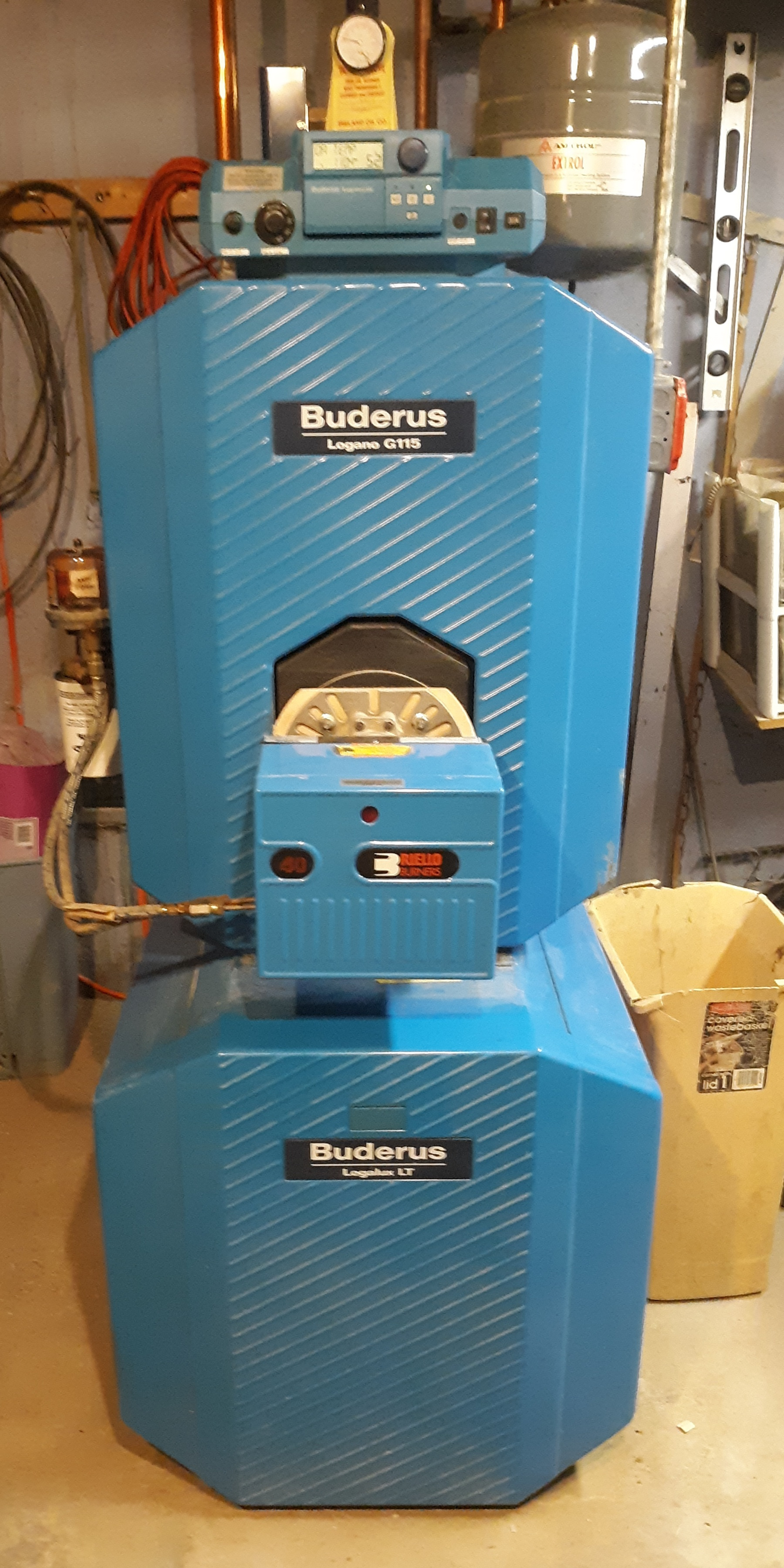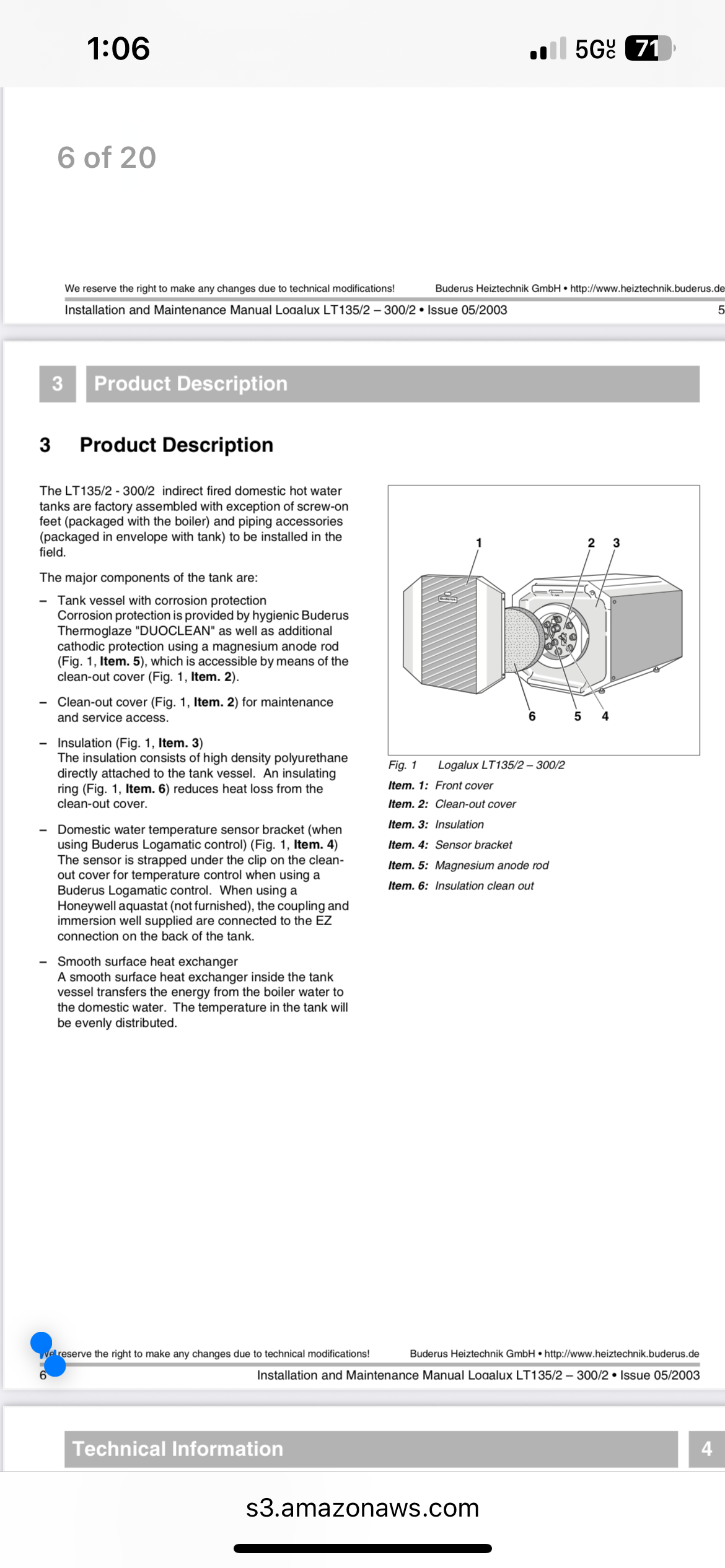Converting to a hot water heater
I had the annual Buderus furnace maintenance done recently. The hot water heating tank is integrated. I asked about checking the anode that self-deteriorates instead of the lining of the hot water tank. The tech showed me the price of draining the tank and checking/possibly replacing the anode. He also pointed out the system is 23 years old, and that age should be considered. He talked about a seperate water heater option. I declined checking the anode for now, even though it's about 5 years old.
The tech was describing a system I believe where the hot water is still produced by the furnace, but stored and partially heated in the stand alone electric heater. I'm thinking toward more of a completely seperate hot water heater. A co-worker with such a system turns his furnace off during warm weather. I like that option. Maybe the overall operating cost would be less with the somewhat integrated system using both the furnace and hot water heater? But I suppose the up front cost would be more with an integrated system.
I'm hoping nothing will have to be done for a while. The company i used just installed a new Roth double wall oil tank. It was only about $100 more than the standard Granby oil tank like what I had previously.
Comments
-
We really need a little bit more detail about what you have and what’s being considered.
I assume that you have a Buderus boiler with an indirect water heater? And that you’re considering a stand alone water heater?
The indirect which is heated by the boiler is the best way if it’s properly controlled.
Can you post some pics of your current setup so that we can better see what you’ve got?
Bob Boan
You can choose to do what you want, but you cannot choose the consequences.0 -
Combi boilers are popular, the do heating and hot water. Some have a small tank built in, some installers add a small electric tank with the combi
They take a little more maintenance than a tank type, but will provide endless DHW at the rated output.
An example
Bob "hot rod" Rohr
trainer for Caleffi NA
Living the hydronic dream0 -
Thanks for the reply. Here's what I have - the Buderus model is a Logano G115. I honestly don't know if this is considered an idirect water heater system. Yes re: considering a stand alone water heater when it comes time to replace what I have now. Noted re: it's best to have an indirect system.
0 -
Hi @Stelcom66 , Could you post pictures of the tank also? Front and top? If it's a glass-lined steel tank and is five years old, it would probably like to have a new magnesium anode.
Yours, Larry
0 -
-
Hi @Larry Weingarten - That's the tank on the bottom. I don't know if it's glass lined. The tank itself is 23 years old, the anode about 5. Yes I'll bet the anode is eaten up at this point.
I could post additional pictures if needed, thanks for your interest.
0 -
Yep just saw your post after I replied to Larry.
0 -
Sorry missed this one. i'm hoping the main heating system will still be good for a while. Had the Buderus installed in 2002. That Combi boiler looks like a nice unit though. That's the first time I saw the pipe crimping system used instead of soldering.
I have a wood stove so my furnace run time isn't typcical for heating. I recently learned the DHW production was set to 24/7, I changed it to coincide during set heating times in the morning and late afternoon/evening with the thermostat on minimum during warm weather since radiator heating isn't needed.
0 -
Hi and thankyou both. I think I need more coffee 😛 It looks like the anode goes in from the front and is horizontal. Also, it looks like the plate the rod is in needs to be removed and held horizontally, so the anode can be fastened to it. So, it's trickier than replacing a vertical rod, but not so hard. Still, it looks like it might take some time, which could be why the tech wanted $$. If the anode is essentially used up, the tank is damaged. If the anode still has much magnesium, the tank is likely sound. Reading the anode is the best way to know how the tank is doing, in my opinion… so I'd want to have a look at it before deciding on a course of action. If you do dig in, please take photos of the anode for us!
Yours, Larry
0 -
@Larry Weingarten the blue box below the boiler burner unit is a horizontal indirect tank. space saver because you can place the boiler on top of the horizontal tank. I like this setup because it places the oil burner at a comfortable working level. Since the boiler flue passages are serviced from a front door opening, you do not need to get to the top of the boiler for any kind of service.
@Stelcom66, You have the best heating and hot water system available. There is no need to install a separate tank with its own heat source (electric gas or oil) and possibly a vent pipe connected to a chimney
I have used an oil fired water heater that was connected to a chimney. Every 4 hours there was enough standby loss up the chimney that the oil burner needed to operate for 8 minutes to bring the water temperature in the tank up to the 125° setting on the control. That happened even if I did not use any hot water. I have found that when you use that Buderus indirect tank, there is so much insulation around that tank that it takes as much as 20 hours for the temperature to drop enough to need the burner to operate to restore the stand by loss.
What I'm saying is that the oil burner connected to the stand alone water heater will run on average 48 minutes each day to maintain hot water even if you do not use any hot water. When you use the oil burner connected to your Buderus boiler to heat water it will operate for about 10 minutes every day if you do not use any hot water in order to maintain the tank temperature. that is because there is no vent connected to the indirect tank, and that particular tank is a better design that any stand alone water heater
Also that particular tank may have a lifetime warranty…. that means they believe that you will never need to replace that tank. and if you somehow need to, they are giving you a free tank for your trouble. I would just do the recommended maintenance on that tank. It will last you many more years!
Edward Young Retired
After you make that expensive repair and you still have the same problem, What will you check next?
0 -
You don’t have to drain the heating system to change or check the anode, just the domestic water in the indirect. That shouldn’t take more than an hour and I’d recommend that it be done.
To switch to a combi would require gas (natural or LP) being available.
As long as you’re using oil, you’ve got the most reasonably efficient system available as long as you keep the Logimatic control set the way you have it and the system is properly maintained.
Bob Boan
You can choose to do what you want, but you cannot choose the consequences.1 -
-
Thanks all for the great information.
@EdTheHeaterMan - So noted re: the Buderus system. Ideally, I'd keep what I have for years to come. I'm kind of wishing now I went for inspecting the anode. I can't complain about the operating cost and capacity of the hot water. I've heard a common failure with a water heater tank, whether it's like mine or a standalone unit, is simply leaking as they age. Maybe I let the anode go too long at this point. If not, I know I'd get hit with another service visit fee with everything else. Hopefully I can hold off until next year, as I'm still 'recovering' from the new oil tank installation cost! All things considered - and the challenges they had with the 2 new holes for the fill and vent - and that they hauled the old tank away, I really can't complain.
@hot_rod - Thanks for that information re: the clean out hole.
0 -
-
The Buderus DHW tank is different from any Direct fire stand alone water tank. I have seen gas fired water heater with a 6 year warranty last 7 years before the tank starts to leak. just long enough for the warranty to be over. I have also owned that exact tank you have. It lasted 28 years in my own home. I don't remember dealing with the anode rod in the 28 years of ownership. Now everybody's water quality is different, so I can't predict what will happen with your Buderus tank. I just believe that you can do the Anode Rod Replacement and you should be fine.
Edward Young Retired
After you make that expensive repair and you still have the same problem, What will you check next?
2 -
Good to know you owned the same tank as I and it lasted that long! Like you said, the anode rod replacement should be the way to go. The system works well with the original radiators in the house from 1954. We've got our first seasonal freeze coming tonight and the wood stove isn't ready yet, so the furnace will be heating the house.
Thanks again for the information and what your experience has been with the Buderus system.
0 -
If I remember correctly, depending on what anode is in the tank, there is an electric test you can do on the anode to check it in place. Just need to check on the Buderus site to get that info.
Also, there are a lot of that combo out there and are a very exceptional combo.
As an aside: I have installed quite a few of that boiler/combo, and I have to say , that is hard to get the boiler up on that tank by yourself. Definitely takes a lot of blocking, and luck. And I'm glad I don't do it anymore as I think my luck was running out.
Rick
0 -
A few years ago I think the tech did a test or some other method to determine the anode was still ok. I'm thinking now I should have went head with getting it replaced, because at this point it probably should be.
I'll bet it's not an easy task getting the boiler on the tank. There were 3 guys that installed the Buderus system if I recall correctly.
0
Categories
- All Categories
- 87.5K THE MAIN WALL
- 3.3K A-C, Heat Pumps & Refrigeration
- 61 Biomass
- 430 Carbon Monoxide Awareness
- 122 Chimneys & Flues
- 2.1K Domestic Hot Water
- 5.9K Gas Heating
- 118 Geothermal
- 170 Indoor-Air Quality
- 3.8K Oil Heating
- 78 Pipe Deterioration
- 1K Plumbing
- 6.6K Radiant Heating
- 395 Solar
- 15.9K Strictly Steam
- 3.5K Thermostats and Controls
- 57 Water Quality
- 51 Industry Classes
- 51 Job Opportunities
- 18 Recall Announcements





